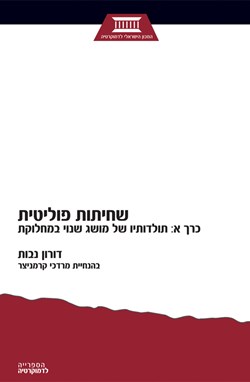Political Corruption
A History of a Controversial Concept
- Written By: Doron Navot
- Supervisor: Prof. Mordechai Kremnitzer
- Publication Date:
- Cover Type: Hardcover | 2 Volumes | Hebrew
- Number Of Pages: 234 Pages
- Center: Democratic Values and Institutions Program
- Price: 85 NIS
This study on political corruption, the first of its kind in Israel, is based on dozens of interviews and court rulings, and utilizes hundreds of press excerpts, State Comptroller reports, surveys, and a broad range of secondary materials. In the three sections of his book, Doron Navot discusses this study and explains the meaning and development of political corruption. In addition, he provides an overview of the changes that have taken place in the scope and scale of corruption in Israel, and concludes by making concrete recommendations for reducing corruption.
What is political corruption? Why do civil servants take advantage of their powers to promote personal interests? Does political corruption necessarily damage the democratic character of the State? How can political corruption be measured? Is Israel considered a corrupt country? If so, how does Israeli corruption compare to that of other countries? Are the efforts to reduce corruption being managed efficiently?
"Political corruption" is commonly understood as the improper use of public office to promote personal interests. However, the standards and criteria for defining what exactly constitutes corruption are subject to dispute.
This study on political corruption, the first of its kind in Israel, is based on dozens of interviews and court rulings, and utilizes hundreds of press excerpts, State Comptroller reports, surveys, and a broad range of secondary materials. In the three sections of his book, Doron Navot discusses this study and explains the meaning and development of political corruption. In addition, he provides an overview of the changes that have taken place in the scope and scale of corruption in Israel, and concludes by making concrete recommendations for reducing corruption.
Beginning with the story of Thucydides in the 5th century B.C., Navot traces corruption through the years. Corruption is the common thread that weaves together tales of tempting virgins, bribing judges and conducting shady political deals. Corruption plays a role in the history of military conquests--narratives of both greed and loyalty. Corruption exists in the world of financiers, of immigrants settling in new lands, of contractors looking out for their best interests, and of civil servants who illegally take advantage of their public offices for personal gain.
This volume constructs the conceptual framework for understanding modern political corruption. The author discusses the various historical meanings and definitions of the terms "corruption" and "political corruption," and builds a comprehensive explanation of this phenomenon.
Information about the second volume of this book, which was published in 2012, can be found here.

